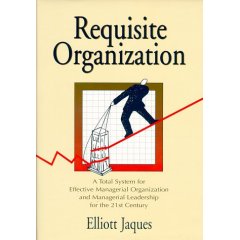Time Span of Discretion- Requisite Point of Clarification
By Michelle Malay Carter on February 10, 2008
 A reader question from my last post reminded me that I?should make the following point of clarification.? As useful as I find the Requisite Organization model, it is not applicable to every organization.?
A reader question from my last post reminded me that I?should make the following point of clarification.? As useful as I find the Requisite Organization model, it is not applicable to every organization.?
Jaques? Requisite Organization meta model, which includes the concept of?time span, applies to managerial accountability hierarchies.? Although some components may be useful, it is not designed for use in its?total-systems form?within partnerships, associations, trade unions, or churches.
A Common Misunderstanding?Regarding Time Span of Discretion
Time span of discretion will provide you with a way to determine the work level of a ROLE within a hierarchy.? You CANNOT use time span of discretion to determine the work level of a single TASK or PROJECT.
For example, a client might hire me to come for one day to lead their line managers through a talent pool evaluation to assess their bench strength.? Even with the after-the-event data input, analysis, and report writing, this ends up being only a one month project.? Using the time span model (inappropriately), that would mean that someone currently capable at level one could do the work.? This is simply untrue.? This is higher level work and requires higher cognitive capability than level one.
In his book Requisite Organization, Jaques tinkered with trying to determine work levels embedded in single projects by describing work levels. But whereas time span is a scientifically validated way of measuring the complexity of a role, here is what Jaques has to say about trying to determine task complexity.?
?This procedure is a subjective descriptive process. ?I do not know of any way, as of yet, to measure objectively the complexity of a task or program. Work with colleagues has been proceeding explicitly for over 10 years now to solve this problem, but no solution is as yet in sight.? It will be a very big step forward if and when we do succeed.? (Requisite Organization, 1998)
Jaques did not see this big step in his lifetime as he passed away in 2003.
Jaques was a scientist and he pushed hard for scientific methods and measures.? It was his gift to us and management science.? However, the descriptive process to determine work level that he describes in his book, with experience and practice, can be quite useful and, IMHO, accurate.? I use it in this blog quite frequently.
Medical doctors, whose work is rooted in science whenever possible, still rely quite heavily on the descriptive process to diagnose and treat patients when scientific means and methods are unavailable or unknown – hence the term “practicing” medicine.
I’m OK.? You’re OK.? Let’s fix the system.
Filed Under Felt Fair Compensation, Requisite Organization, Work Levels
Comments
2 Responses to “Time Span of Discretion- Requisite Point of Clarification”

Getting back to Michelle’s point that something smells about CEO compensation levels, let’s ask, “Why do boards do that?” I’d posit three possible reasons (feel free to add others, but I suspect these fit the vast majority of cases):
* Board-room backscratching – When an established CEO’s salary and bonuses don’t line up with the company’s performance, it looks like the board members are “taking care of one of their own.” While the U.S. public seems to believe that almost all cases of excessive CEO compensation fall in this category, I suspect that it’s the smallest of the three causes that I’m putting out there, as it’s more of an “insider” phenomenon. With more CEO’s coming in from outside the organization, there’s less likelihood of this happening (and I doubt that board members and CEOs are all members of a secret “robber baron” cabal).
* CEO hero-worship (i.e., the current CEO is indispensable) – When a CEO?s salary starts out in a reasonable range, but inflates beyond justification with the passage of time, I suspect that the board members have come to believe that only the current CEO (and no one else) can give the company the results they want. Ergo, the current CEO must be retained at all costs (and they usually think that it costs a lot).
* CEO as savior (or ?signing the best available athlete?) – This is closely related to CEO hero-worship, but isn?t even based on early positive results?it?s entirely predicated on the board?s estimation of a CEO candidate?s potential, and the compounding fear that if they don?t make an overwhelming compensation offer, someone else will offer more. Compound this with market pressures in the business? product or service sector, and a board sees the CEO as a savior who they simply can?t do without (again, no matter what the cost).
I suspect that the latter two possibilities fit the majority of cases of excessive CEO compensation, and are indicative of a board-level groupthink that has infected the ranks of corporate boards (the so-called ?cult of the super CEO?). All this is quite unfortunate, as Jim Collins has addressed this fallacy quite effectively in Good to Great, where he points out that the superstar CEO, while possibly giving short-term advantage (and there?s no guarantee of that) almost never gives a company long-term advantage, since they lead by force of personality and skill (yes, some do get great results during their tenure, or at least the early part of it), but don?t ?build to last? (results fall off after the “super CEO” leaves).
Will,
Welcome to Mission Minded. You’ve got some good thoughts here. All completely plausible.
Yes, the short term mind sets are coming home to roost. Thanks for the comment.
Michelle